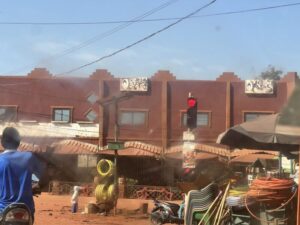By Grace Egila
In an effort to enhance professionalism in media practice through adherence to the professional code of ethics for journalists, Stallion Times Media Services has trained 80 journalists on the code of ethics and moral issues in journalism practice in Kano and Kogi states.
The training is under the participatory governance and media literacy project tagged “Get Involved, Dialogue and Improve (G-DRIP)” in Kano and Kogi states.
The project is in collaboration with the Wole Soyinka Center for Investigative Journalism (WSCIJ) under the Collaborative Media Project working to improve media independence and government accountability, funded by the MacArthur Foundation.
In April 2022, no fewer than 40 journalists cutting across broadcast, blogosphere, and print newspapers were trained on the ‘code of ethics for journalists in Lokoja, Kogi state.
The Project Coordinator and Editor-in-Chief, Stallion Times Media Services, Isiyaku Ahmed noted that the code of ethics deals fundamentally with Editorial Independence, Accuracy and Fairness, Privacy, Privilege/Non-Disclosure, Decency, Discrimination, Reward, and Gratification; Violence; Children and Minors; Access to Information; Social Responsibility; Plagiarism, and Copyright.
He told the participants that while objectivity in today’s overheated political environment might be arguably impossible, they owed it a duty to make impartiality their ultimate goal.
“Even those of you who get paid to write opinions, columns, editorials, talk shows, and blogs should at least be aware of all the relevant ethical codes.
“To rid the media of non-professionals, who often give journalists a name bad requires a holistic approach by all stakeholders,” he added.
He emphasized the need for journalists to adhere strictly to the ethics of their profession as one of the attributes of discharging their duty effectively.
He called for enhanced professionalism and adherence to the ethics guiding the practice, adding that the incidence of quacks should be checked by regulatory authorities like the Nigerian Press Council and other regulatory bodies.
The workshop was characterized by interactive and participatory discussion, question and answer sessions, and personal experiences emanating from media space in the state.
In his goodwill message, the NUJ Chairman, Kano Council, Abbas Ibrahim thanked the management of Stallion Times media services for conducting the training in Kano, saying “this is a refresher workshop to remind journalists on code of ethics to improve on their professionalism.
“Journalists, by their conduct, should act independently by putting the public interest first,” he reminded the participants.
He also urged the participants to step down the training in their various organizations so that they will be on the same page for better media practice.
The Kano training consultant, Adamu Ladan who took the participants through an elaborate explanation of the code and ethics in journalism practice, emphasized the reason why it is important for the new media to come together to regulate themselves.
He shared his experience with Journalists on media ethics and ethical concerns.
He noted that the use of unreliable information or attribution to anonymous sources, sensational headlines as well as a fixation with single-story sources as some of the ethical issues bedevilling professionalism in Nigeria.
Participants pointed out that, ethical considerations hardly count for some journalists who are being owed salaries for several months by their employers and therefore call for better remunerations and a working environment.
Maryam Shehu Umar, a participant thanked the stallion Times for the initiative.
“A lot of journalists do not have the opportunity of such refresher training; hence, they tend to forget their responsibility to serve the people in the best of ethical manner,” she said.
Another participant, Annabel Eze said indeed, training journalists in this dispensation is very important as many practitioners now package falsehood which can give the profession a bad name.
“With this training, most of us will ensure to do the right thing; write or report with utmost accuracy and balance,” she added.”
Three syndicate presentations on identifying attitude that undermines ethics in media practice and news reportage, ethics in a converged media environment, and rethinking ethics were made.
At the end of the training, a communiqué jointly signed by the Stallion Times CEO/Editor-in-Chief, Isiyaku Ahmed, and the Kogi State NUJ Chairman, Adeiza Momoh-Jimoh, and Kano UNJ Chairman, Abbas Ibrahim, was issued.
It urges practitioners to uphold accuracy and objectivity by reporting all sides of a story and ensuring fairness and impartiality to minimize harm through reportage.



